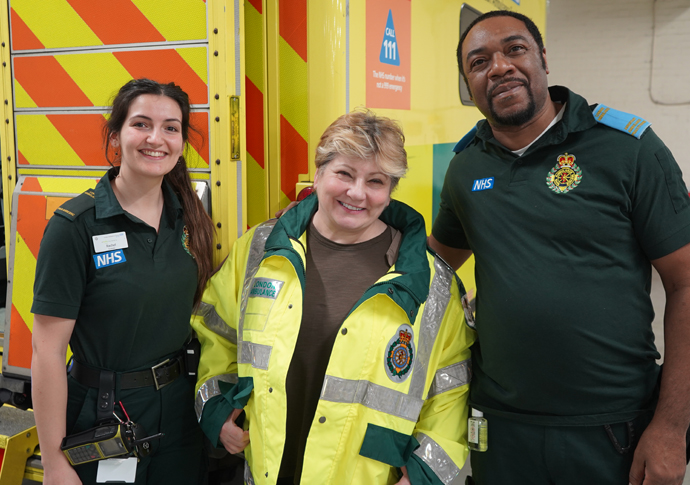MP on the 999 front line during ‘rideout’
Day in ambulance aims to put focus on waiting times
Friday, 16th February 2024 — By Charlotte Chambers

Emily Thornberry with Rachel and Derek of the Islington Ambulance Service
WHETHER you’re in the middle of a crisis or not, having Emily Thornberry accompany you on your ambulance ride to hospital must be a bit of a shock.
The MP for Islington South spent the day out with the NHS as part of a campaign to raise a spotlight on excessive waiting times that are putting lives at risk.
“The NHS is completely different to when we were in government, and that the Tories have wrecked it, that’s really the point I’m making,” she said following the “rideout” on Friday.
And after witnessing a full Accident and Emergency waiting room at 8pm, she said: “I thought it was appalling, of course I did. It’s absolutely terrible.”
Earlier that day she described meeting a patient who needed specialist care but had been given a six-week wait time. She explained how the patient then experienced a “crisis” – and called for an ambulance – but despite being rushed to A&E, was still unable to access specialist care. She was told her waiting time would remain unchanged.
“If we get the opportunity to go into government, we will have a great deal of work to do,” Ms Thornberry said of the current delays in treatment.
The British Medical Association recently reported most patients awaiting treatment have seen their waiting times double to almost 15 weeks in the years since Covid hit, while the average ambulance waiting time for people suffering heart attacks and strokes is currently around half an hour, according to the British Heart Foundation.
The target for responding to such emergencies – classified as a category 2 – was 18 minutes, although it was changed to 30 minutes last year.
There aren’t enough ambulances in Islington, Ms Thornberry warned, but part of the problem is ambulances getting stuck outside hospitals as a proxy hospital bed.
UCLH now has a 45-minute turnaround time set for ambulances but this still marks a dramatic increase in waiting times compared to 2019 when just 1 in 50 ambulances waited more than an hour outside the UK’s hospitals. There were around seven ambulances in Islington’s depot.
Describing the A&E as the “canary down the mine,” Ms Thornberry said: “You can tell the state of the National Health Service by the state of the emergency service because, in the end, if the other bits aren’t working the emergency services pick up the pieces.”
Some of the desperately ill people Ms Thornberry met when she spent a day riding around in one of the ambulances from Islington’s Ambulance Station by Caledonian Road, didn’t recognise her. But their families did.
“Are you Emily Thornberry?!” they would ask as they clambered into the back of the ambulance with her – and paramedics Derek and Rachel – on their way to King’s Cross’s University College Hospital.
Ms Thornberry praised the paramedics, adding: “The real eyeopener for me was how, despite all the pressure that they were under, they were able to do their job so well. I was just astounded. If I had to be in a terrible medical emergency, I wouldn’t want anyone but them to come.”